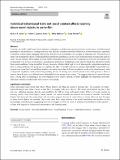Individual behavioural traits not social context affects learning about novel objects in archerfish
Abstract
Learning can enable rapid behavioural responses to changing conditions but can depend on the social context and behavioural phenotype of the individual. Learning rates have been linked to consistent individual differences in behavioural traits, especially in situations which require engaging with novelty, but the social environment can also play an important role. The presence of others can modulate the effects of individual behavioural traits and afford access to social information that can reduce the need for ‘risky’ asocial learning. Most studies of social effects on learning are focused on more social species; however, such factors can be important even for less-social animals, including non-grouping or facultatively social species which may still derive benefit from social conditions. Using archerfish, Toxotes chatareus, which exhibit high levels of intra-specific competition and do not show a strong preference for grouping, we explored the effect of social contexts on learning. Individually housed fish were assayed in an ‘open-field’ test and then trained to criterion in a task where fish learnt to shoot a novel cue for a food reward—with a conspecific neighbour visible either during training, outside of training or never (full, partial or no visible presence). Time to learn to shoot the novel cue differed across individuals but not across social context. This suggests that social context does not have a strong effect on learning in this non-obligatory social species; instead, it further highlights the importance that inter-individual variation in behavioural traits can have on learning.
Citation
Jones , N A R , Spence-Jones , H C , Webster , M & Rendell , L E 2021 , ' Individual behavioural traits not social context affects learning about novel objects in archerfish ' , Behavioral Ecology and Sociobiology , vol. 75 , 58 . https://doi.org/10.1007/s00265-021-02996-4
Publication
Behavioral Ecology and Sociobiology
Status
Peer reviewed
ISSN
0340-5443Type
Journal article
Description
This study was funded by the Fisheries Society of the British Isles (studentship to NARJ).Collections
Items in the St Andrews Research Repository are protected by copyright, with all rights reserved, unless otherwise indicated.

